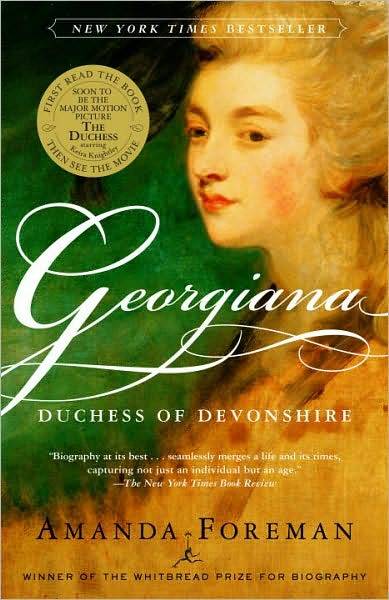Often, I really like a book that I’m reading. And, I like nerding out and talking about it. No one else that I know has yet read Amanda Foreman’s biography of Georgiana Cavendish (née Spencer) Georgiana, Duchess Of Devonshire. Engaging, painstakingly researched and oftentimes this is a bittersweet look at one woman who represented many women, and men (!) both literally and figuratively in the 18th C. & early 19th C Britain.
Georgiana was a bright, lively, smart and amazingly energetic woman interested and talented in writing, politics, and science. She was able to press forward despite some of the constrictions on women’s participations in professional and / or esteem in these arenas. It’s also stunning to see how fragile the balances of power can be in one of the world power governments was at the time, and their reactions to Revolutions happening in and all around Britain at the time. Revolution had taken place once again in Britain in 1688, and a century later the country was still grappling with Regency vs. Constitutional governance, as Ireland, The United States, and France fell into full-scale and violent revolutions and nation-making, and un-making all at once.
Sometimes, through certain biographies or stories, you get a clear sense of how wasteful discrimination whether based on gender, race, sexual or religious orientation, and the like, can be when you see with such clarity talent subdued and held back. In this case, the discrimination was based on in Georgiana’s gender. Yet despite the restrictions of her time, Foreman shows the huge direct influence that Georgiana had on the politics and government in her lifetime. It’s actually astonishing.
I do have to say, the fact that the movie “The Duchess” claims to be based on this book a trifle confusing, as some of the pivotal moments in Georgiana’s life are nowhere to be found here. And in some cases, that’s relieving. However, there are other events in her life not in the film that are just as brutal and tragic, and she cuts a fair and nostalgia-worthy figure for sure from her remaining letters and historical remnants about her.
Aside from the times of her life both public and private, there is another almost unbelievable world at work as well in her story. A famous beauty, it was often noted that she was loved & adored by every man but her husband. This seems like no exaggeration. Entering into marriage with the 5th Duke of Devonshire as a young and lively romantic, she soon found the realities of her new rank quite a life unexpected. Not the least of which was the Duke’s relationship with Georgiana’s best friend, Lady Elizabeth Foster who eventually came to live with them in a very complicated and tumultuous 3-person marriage. Menage a trois seems to be inaccurate, as it reflects a more sexually based fling. What the Cavendishes & Foster created and lived in was something far more emotional, political and complex. This publicly known living situation, while scandalous to a large degree, and mysterious to all including the Duke, Duchess and Bess (as she was known), it was their lifelong arrangement. It lasted through thick, thin, and even legitimate and illegitimate children throughout the extended family until the end of each of their lives.
Georgiana’s life was enmeshed with the politics of her time in a complex way the same as her private home life was enmeshed with friendship, duty, and marriage. She fell in love with Charles Grey (namesake to the tea flavor, Earl Grey) while working closely with the Whigs and the Prince of Wales (later George IV). Her lifelong lifelong friendships with both men endured many bitter times, including becoming pregnant by Grey, and the subsequent birth and fostering out Georgiana’s beloved illegitimate daughter to Grey’s extended family. Of her many heart breaks, her relationship with Grey was her greatest. It’s quite a shame that she didn’t live to see him become the Prime Minister of England, an achievement that she would have been thrilled by.
It’s also interesting, though really no surprise at all that Georgiana Cavendish was Princess Diana‘s great-great-great-great-great-aunt, in many ways. Hard not to draw comparisons, surely.
I’d recommend this for anyone, though particularly those interested in history, the history of the Whig party, 17th C. politics & Britain, as well as women of that era, women’s history, and just a good compelling biography.



Pingback: Tweets that mention A little light winter reading: “Georgiana, Duchess of Devonshire” | strawberryluna bloggery -- Topsy.com